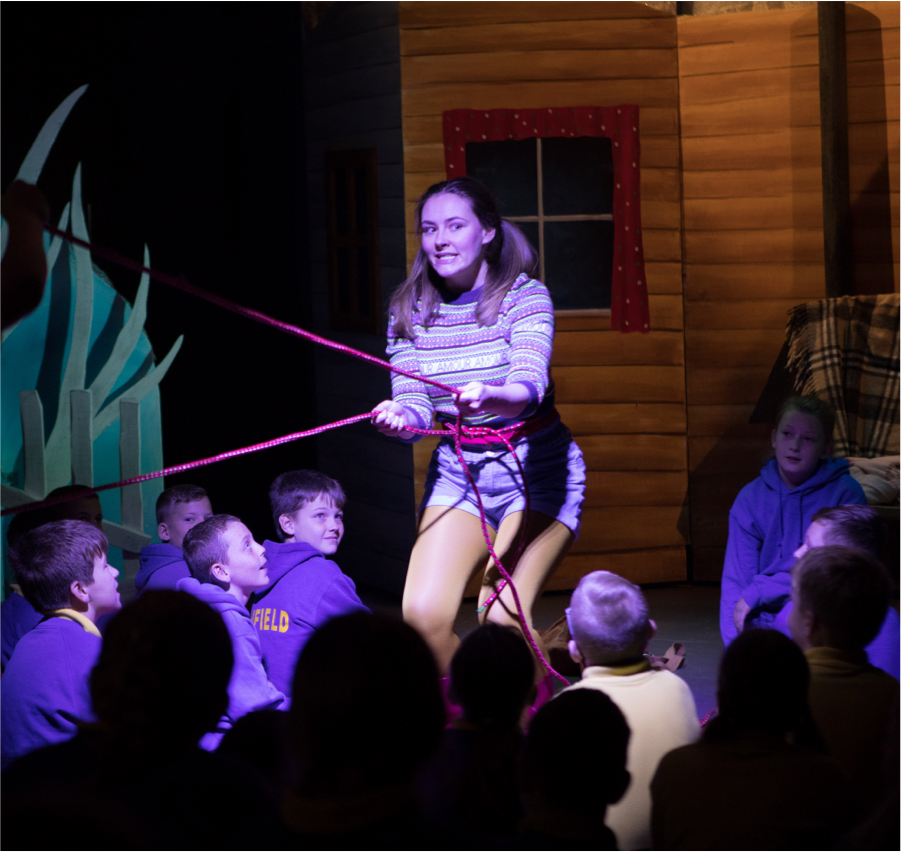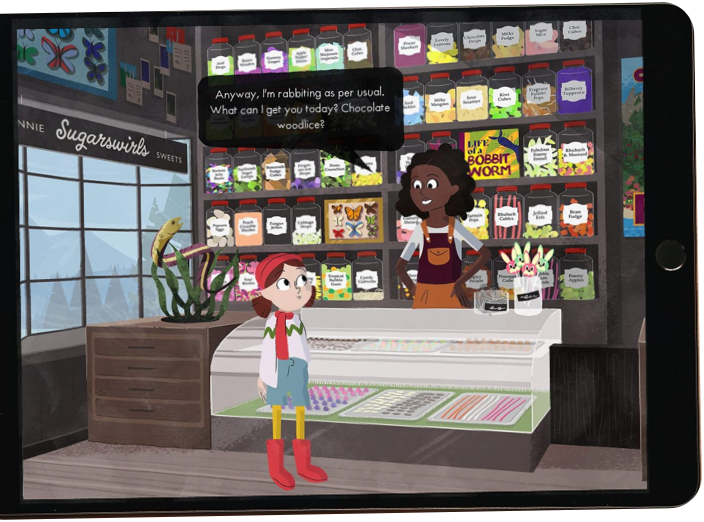Research and themes in Melva
A fun and unique approach, rooted in legitimate mental health strategies.

Why Melva –
why now?
Children’s mental health problems were already on the rise before COVID-19, with Public Health England estimating in 2017 that 1 in 8 young people had a diagnosable mental health condition (1).
Now, these figures are predicted to be closer to 1 in 6 (2), and there are growing fears about the lasting impact of the global pandemic on many children’s lives. It has never been more important for us to find new ways to engage young people in conversations about mental wellbeing.

Early intervention for children and young people
Designed in response to the 2017 green paper Transforming children and young people’s mental health provision.
The Melva programme focuses on early intervention for children and young people, by supporting them to develop resilience pathways and positive emotional responses and relationships.
Melva uses recognised and recommended mental health first aid strategies – communicated in a child friendly and accessible way – to teach children how to recognise, understand and manage their mental wellbeing.
A child-friendly approach to addressing big topics
Giving children a form of accessible language to talk about mental health makes it easier to facilitate open, honest, and regular conversations.
By having these conversations, we can help children understand that their feelings are normal, and everybody experiences them – reducing feelings of isolation by helping people feel connected to and empathise with one another.
Here are a few examples of the playful language and approaches writer, Danielle Burn, uses to achieve this in the Melva stories:
-
Worrits
Instead of using big words like fear, worry or anxiety, in the Melva world we talk about ‘worrits’.
Worrits are described as “squirmy creatures that live inside every human’s tummy”. Good worrits are important – they exist to keep you safe from danger. But sometimes, good worrits can turn ‘bad’, wriggling their way up from your tummy and into your head. These worrits can have strange effects on your mind and body – making you think of things that might never happen, or that you have no control over.
Talking about worrits in this way helps children to critically analyse them – developing a better depth of thinking and helping them to understand the link between our thoughts and our physical responses.
-
What ifs
When we’re experiencing worrits, it can be easy to fall into a spiral of negative thinking – sometimes referred to as catastrophising – where we picture one bad thing happening, which leads to another bad thing, which leads to another bad thing, and so on and so on. This build-up can make something relatively small, feel huge.
For Melva, these thoughts usually start with a “What if…”
Melva’s What If moments are deliberately playful and funny, to help draw children’s attention to this behaviour. It makes it easy for children to understand how ridiculous Melva’s thoughts are getting – an observation they can then be encouraged to apply to their own thinking and responses.
-
Niggling Voice
We all have that niggling voice in our heads. When they’re on their worst behaviour, we might catch them telling us that we’re not good enough, or funny enough, or that nobody likes us. But our niggling voice is actually a really important part of healthy psychology.
Healthy psychological maturing is all about learning how to interpret the information we get from our niggling voice, and making decisions about how we behave based on whether this influence is productive or inhibiting.
Melva’s niggling voice is personified in the character of Gideon who, over the course of the Melva stories, becomes a more supportive and positive influence for Melva.
-
Brave isn’t how you feel, it’s what you do
This motto tells us that confidence is not the absence of fear. Learning and growing require us to do things that we’re unsure about or that scare us, but we aren’t defined by those feelings. What matters is the action that you take and the choices that you make.
Everybody has things they’re scared of or that worry them, because it means we care about what we’re doing. The important part is developing self-awareness and skills to work through fear and not let it stop you.
-
Calm first, answers later
Sometimes, in an effort to protect us, our brains can make our bodies react certain ways when we’re in stressful or scary situations – but it’s not always helpful or appropriate. For example, we might feel frozen on the spot, or like we have bundles of energy inside us, waiting to explode.
It’s not always easy to think clearly when we’re feeling that way, so we need to address the physical symptoms before we can make a good decision about what to do next. Once we recognise our physical fear symptoms, we can identify what strategies help to manage them – like deep breathing, or exercise – and eventually we can understand what triggers those feelings in the first place.
-
Understanding your Grussle
In the Melva world, a ‘Grussle’ is a shape-shifting creature, whose favourite thing to do is taunt and tease you, by remembering all the most horrible things people have said in the past to upset you, and repeating them back to you.
The Grussle character is there to teach children about the importance of surrounding themselves – wherever possible – with people who have a positive influence on how they feel, and not the opposite. It is designed to spark important discussion about what constitutes a positive friendship or relationship, and how not to let things that have upset you in the past, hold you back in the future.

Age-appropriate content that aligns with the curriculum
The themes explored in Melva directly relate to the primary school aims laid out in the statutory Relationships, Sex and Health Education (RSHE) curriculum.
Some specific examples include supporting children to:
- Recognise and articulate how they are feeling ^
- Develop self-care techniques ^
- Understand that mental wellbeing is a normal part of daily life ^
- Identify where and how to seek support ^
- Recognise the characteristics of caring friendships ±
- Understand that other childrens’ families sometimes look different from theirs ±
^ Mental wellbeing curriculum aims
± Relationships education curriculum aims

See how you can
use Melva
The Melva programme has been developed in ongoing consultation with children, teachers and families since 2017, and is available for you to use in your own setting now

Frequently asked questions
How long does a license last?
School licenses last until the end of the academic year in which they were purchased and will renew automatically at the start of the following year unless cancelled, with invoices issued in July. If you purchase a license towards the end of an academic year e.g. Summer Term, we will liaise with you directly to discuss your license start date.
Family licenses do not expire, but are limited to 4 user profiles and once the game has been completed, it can’t be restarted.
Community or non-academic group licenses will be agreed on a case-by-case basis.
Do you offer any discounts?
We have various discounts available on our online Melva packages, including discounts for multi-license purchases (e.g. via a school trust or a corporate sponsorship) and discounts on license renewals.
Get in touch today to discuss bespoke discounts for group or setting.
When will the live show be available again?
Touring the live show takes a big team of people, a lot of expensive equipment, and a lot of planning – all of which costs a lot of money. In order to make the live show affordable for schools and groups, we need to raise a significant amount of funding to subsidise the cost, and therefore we do not currently have plans to tour the live show again anytime within the next couple of years.
What age range is Melva for?
Melva is designed for young people aged 7-11 (Key Stage 2 in England and Wales, or P4/P5/P6/P7 in Scotland).
Note: Some of the language used in the game may seem advanced for Lower Key Stage 2 (P4/P5). Throughout the Melva programme, we’ve tried to balance the content so that it will appeal to both the upper and lower end of this age range – inevitably this means not everything will land with every child the same way, but this will not hinder their experience.
Who do I contact if I’m having issues with my login?
If you are having trouble with your Melva online login, please contact melva@mortalfools.org.uk and we will endeavour to get back to you as soon as possible.
Note: The online user guides also include some basic troubleshooting tips, so please make sure you’ve read this carefully before you start using the platforms.